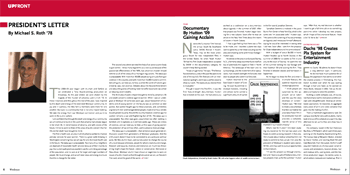ENTREPRENEURS
 Eric Dachs ’98 admits he doesn’t have a long attention span. In particular, he did not have much patience for all the paperwork that seems to smother the creative process in filmmaking. His frustration bubbled over when he was wading through e-mail and faxes as he worked on Panic Room, released in 2002. Fed up, he created a company to solve the problem.
Eric Dachs ’98 admits he doesn’t have a long attention span. In particular, he did not have much patience for all the paperwork that seems to smother the creative process in filmmaking. His frustration bubbled over when he was wading through e-mail and faxes as he worked on Panic Room, released in 2002. Fed up, he created a company to solve the problem.
Building a viable company was, of course, not that simple, but his motivation and the concept were straightforward. Develop an online-based application, he reasoned, to aggregate every piece of print and video collateral that goes into the making of a film.
That’s a mammoth organizational task. On campus recently for talks with students, Dachs took time out of his schedule on a warm Sunday afternoon to set up his Mac and show how it all works.
His company, based in the San Francisco Bay Area, is PIX System, which spent three years working on the Academy Award-winning film, The Curious Case of Benjamin Button, directed by David Fincher, and starring Brad Pitt and Cate Blanchett. From the outset, the film’s staff acquired materials at a furious pace: script revisions and annotations, location photos, hair and makeup stills, casting tests, and the like. Once production began, the dailies came in, which editors reviewed and marked up. Then it was on to post-production, where digitally edited dailies, sound, background sound, music, and special effects all come together.
Benjamin Button generated about a half million individual items shared among 350 individuals worldwide, more than a dozen vendors, and two major studios, Paramount and Warner Brothers. It was symphonic in its complexity, and PIX System mediated every note.
The beauty of the Web is that a film editor in New York who needs to see yesterday’s shooting in LA does not have to wait for the FedEx delivery or find a screening room. The dailies are digitized and immediately uploaded to the PIX site. The editor in New York—or Kuala Lumpur, for that matter—needs only a laptop and Web connection. The software provides means for annotation and marking up individual frames, as well as many other features that fit right into the work style of busy editors.
And that’s the key. Dachs doesn’t like to read instruction manuals and, according to him, people in the film industry are likewise averse to spending time learning a new software system. Dachs capitalized on his familiarity with the industry, gained through several years of work as a sound editor, to design a product that would mesh seamlessly with the work styles of overworked filmmakers.
The company’s strategy since its launch five years ago has been to connect with individuals whom the industry watches and to keep developing the system. Client projects include Jarhead, Roadtrip Nation, Lord of the Rings, Indiana Jones & the Kingdom of the Crystal Skull, the Nike “Fate” commercial, and many more. Network news programs and commercial producers have used the system. Recently, PIX added several top technical professionals from Silicon Valley to its staff of 21 individuals as their work continues to expand into different Hollywood studios.
“The real secret sauce is having a comprehensive system,” says Dachs. That’s the element competitors so far have lacked.
The company is still young enough that it doesn’t have an overly formal structure, though Dachs says it’s not a “garage business” and will undoubtedly have to acquire more of the trappings of business organization as it continues growing. He manages to keep engaged in everything from sales and financial oversight to coding of prototypes.
“It’s an incredibly thrilling time in my life,” he adds. Before closing his Mac, he offers his thanks to Wesleyan’s theater department, in which he majored. It was great training for business, he insists. He and his fellow students were given a budget and set free to create. “At the end,” he says, “you had to have a show.”

